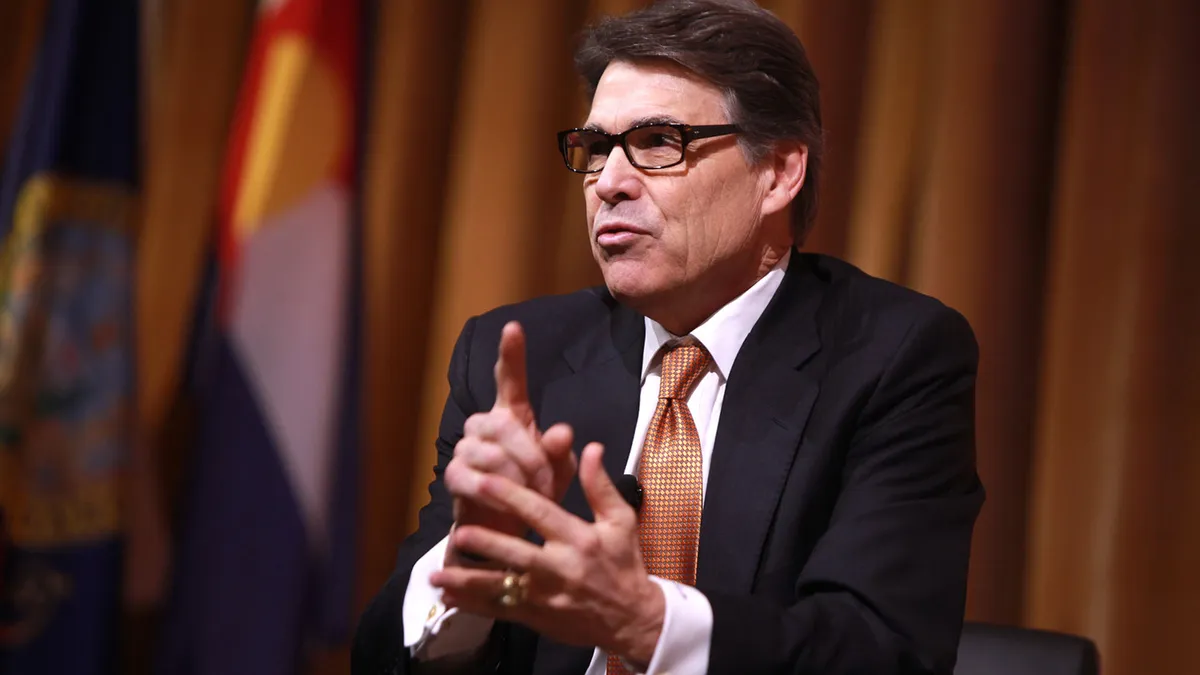Dive Brief:
- Secretary of Energy Rick Perry on Friday ordered a review of the U.S. electrical grid, aiming to ascertain whether policies to boost renewable energy are hastening the retirement of coal and nuclear plants and threatening power reliability.
- According to Bloomberg, Perry directed his staff to develop a plan to evaluate how power sector regulations, subsidies and tax policies are contributing to changes to the "erosion" of baseload power capacity. Federal subsidies for wind and solar energy were renewed at the end of 2015 and are due to wind down in the early 2020s.
- The review comes as a number of states move to subsidize baseload generation, particularly nuclear plants, that cannot compete with cheap natural gas and renewable energy in wholesale power markets. The Federal Energy Regulatory Commission will hold a technical conference on the state power subsidies at the beginning of next month.
Dive Insight:
The retirement of baseload power plants is a well-known trend in the utility sector.
Since 2000, utilities have announced more than 100 GW of coal generation retirements; in 2015 alone, nearly 14 GW came offline, accounting for 80% of the plant retirements that year.
Nuclear facilities and older gas plants are also starting to feel the pressure. Last year, SNL identified more than 21 GW of baseload coal, nuclear and gas generation at risk of early retirement through 2020.
Power generators and conservative politicians frequently fault renewable energy subsidies for depressing prices in wholesale power markets, leading to the retirements.
Perry's power sector review appears to single out the intermittent wind and solar resources for scrutiny, praising baseload power supplies and calling for an investigation into subsidies that push them offline. He also tasked his chief of staff, former EEI policy head Brian McCormack, to ascertain whether wholesale power markets adequately value the reliability attributes of baseload coal and nuclear plants, including on-site fuel supply.
Many in the power sector, however, point to persistently low natural gas prices and stagnant load growth as the principal factors behind the early retirement of coal and nuclear plants. And the nation's wholesale power market operators, such as the PJM Interconnection, say the increasing penetrations of renewable energy do not pose a threat to reliability.
“Let’s not pick on renewables,” Ralph Izzo, CEO of PSE&G, a utility and nuclear operator, told Utility Dive last year. “If I look at the three reasons why our margins have been compressed at nuclear plants, it's first and foremost natural gas, and a close second between increasing operations and maintenance cost and increasing renewables penetration.”
Nuclear plants account for about a fifth of U.S. power capacity and the majority of the nation's zero-carbon generation, leading many states to devise "around market" subsides to keep them online in the face of market forces. Such measures have been passed in New York and Illinois and are under consideration by lawmakers legislatures in Connecticut, Ohio, Pennsylvania and New Jersey.
Those nuclear subsidies have also sown fear among independent generators of depressed power prices, leading FERC to call for a technical conference on May 1 and 2.
The DOE review of renewable energy policies and reliability will reportedly last 60 days, beginning on Friday, April 14.
Read the full memo from Secretary Perry below:
Energy Memo by Gavin Bade on Scribd













